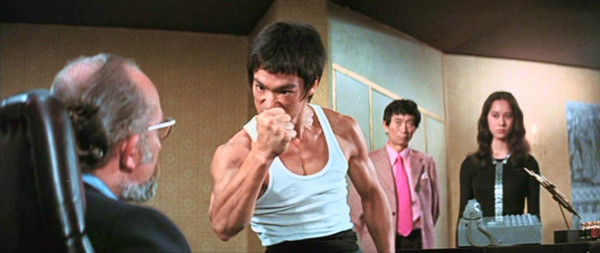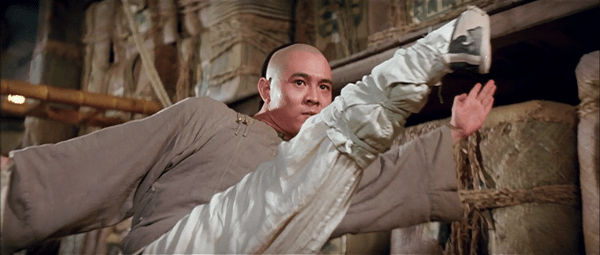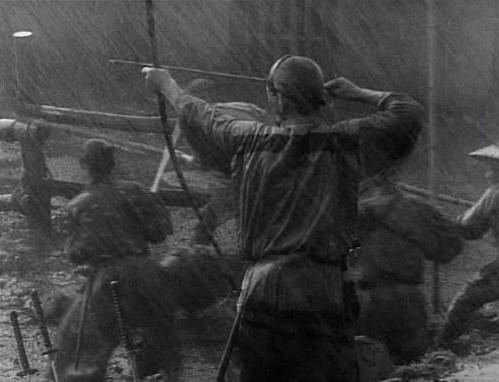This week, the Cinerama is playing what they’ve dubbed their “First Mixed Martial Arts Festival”, a collection of movies, Hong Kong and Japan mostly, in which kicking, punching and/or swordplay is prominently featured. Playing two or three different movies per day, mostly DCP but with some 35mm, its an eclectic mix of masterpieces, curiosities and what amounts to an almost-complete Bruce Lee retrospective.
I don’t think I’ve ever been as mixed about a film series as I am about this mixed martial arts series. On the one hand, and probably most importantly, there are a bunch of great movies playing here, included some films that haven’t played in Seattle since the heyday of Landmark’s Hong Kong repertory run in the mid-1990s. The chance to see Bruce Lee, Jackie Chan, Toshiro Mifune, Stephen Chow and Jet Li in that gorgeous Cinerama environment is not to be dismissed lightly. Even under less than ideal conditions, like digital projections of DCPs and Blu-Rays, seeing these films is a treat. But there appears to be no rhyme or reason to the way this festival was put together, with many of the best films showing at the most inconvenient times, no clear threadlike connecting the films from different countries or eras and a lot of sub-standard source material for a repertory festival.

While I can look past digital, I can’t abide dubbing, and two of these films will be playing with cheap, idiotic American soundtracks, which is unconscionable in repertory programming, especially considering they’re playing digital versions of films for which original language tracks exist. I’d contend that the wholesale dubbing of Hong Kong film is one of the greatest crimes against cinema of the last half century, easily on par with panning and scanning and Ted Turner’s misbegotten colorization quest. It has effectively reduced what has been for at least 60 years one of the most vital and innovative cinemas on the planet to a punchline, to trash, to something that no one could ever bother to take seriously. While no one in their right mind would ever projected a dubbed version of an Akira Kurosawa film, similar respect is apparently not expected for the works of Yuen Woo-ping or Lau Kar-leung, both of whom have seminal films showing at the Cinerama in these bastardized versions.
The Lau film, Drunken Master II, is being shown under its Miramaxed title, Legend of the Drunken Master, a cut version of the real film, with a re-recorded sound-effects track and score, in addition to the English language track. The Yuen is Snake in the Eagle’s Shadow, one of two collaborations between Yuen, his father Yuen Siu-tien and Jackie Chan from 1978 (the other being the first Drunken Master, and yes, it sure would have made a lot more sense to play that one before Drunken Master II, as both of these Chan movies are playing on Friday) that revolutionized the kung fu film and rocketed Chan to superstardom. Fortunately, these are the only two dubbed films being shown in the series.
The Bruce Lee films are of course a major draw. He remains an electric performer and it’s not hard to see why audiences worldwide flocked to his films in the early 1970s. The Cinerama is playing three of his great starring roles (Enter the Dragon, The Chinese Connection and The Way of the Dragon) along with that posthumous Frankenstein of a film, 1978’s Game of Death. The one major Lee film they aren’t playing is Fist of Fury, which is kinda funny since they named the series after it. (EDIT: Actually, they are playing it, but under its American title The Chinese Connection. What they aren’t playing The Big Boss, Lee’s breakout film which was released in the US as Fists of Fury. Wikipedia concisely relates the story: “When The Big Boss was being prepared for American distribution, it was to be retitled The Chinese Connection, a play on the popular The French Connection, since both dealt with drug trafficking. The title of Lee’s second film, Fist of Fury, was to be identical, except for being Fists of Fury. However, the titles were accidentally reversed. The Big Boss was released as Fists of Fury and Fist of Fury became The Chinese Connection. ” So bravo to the Cinerama for continuing this proud tradition of ignorance and neglect.)
Also playing are two 21st Century Stephen Chow films, both of which were cross-over hits in the US, Shaolin Soccer and Kung Fu Hustle. Both films are playing on 35mm, though it’s unclear which version of the former they’re playing: the running time says 90 minutes, which doesn’t correspond to any of the versions listed on imdb (the closest is the 89 minute Argentine cut). There were two US cuts of the film, mangled by Miramax into 85 and 87 minutes versions, each with laughably poor translations. The original cut of the film is 113 minutes long.
Three other Hong Kong films make the series on Blu-Ray. The biggest draw is Tsui Hark’s Once Upon a Time in China, from 1991. A version of the Wong Fei-hung story that established Jet Li as a star (with an excellent supporting performance from Yuen Biao), it’s one of the greatest of all kung-fu films. The Tsui-produced, Yuen Woo-ping-directed 1993 film Iron Monkey is also playing, a variation on the Wong legend that features Donnie Yen, it was also ridiculously mangled by Miramax. They released it in 2001, in an attempt to capitalize on the success of Crouching Tiger, Hidden Dragon. They re-translated the film, changing Wong Fei-hung’s name (because American audiences wouldn’t know who he was) and re-recorded the score to make it sound like Ang Lee’s hit. That appears to be the version the Cinerama is playing. They’re also playing a more recent Donnie Yen movie, his Ip Man, directed by Wilson Yip. It’s probably the least good of the five Ip Man films released in the last few years, but at least it probably hasn’t been tampered with.
In addition to these Hong Kong films, the series also features a handful of Japanese classics, three directed by Akira Kurosawa and familiar ones to Seattle screens. Of course Yojimbo and Rashomon and Seven Samurai are great films, in fact, Seven Samurai is quite literally The Greatest Film, so if you haven’t seen them any of the other times they’ve played over the past several years, you most definitely should. Though, I’d strongly argue that Rashomon has no place in a “martial arts” film series. The other two Japanese films, both directed by Masaki Kobayashi (Harakiri and Samurai Rebellion) are slightly more relevant: harsh indictments of the hypocrisy and inhumanity of the samurai code, they had a strong ideological impact on later Hong Kong cinema, especially the films of Chang Cheh and his influences like John Woo, Ringo Lam and Johnnie To (each of whom are missing from the series).
Rounding out the series are a trio of American films. 1974’s Black Belt Jones is a blaxploitation riff on the Bruce Lee craze starring Jim kelly and directed by Enter the Dragon’s Robert Clouse. Quentin Tarantino’s Kill Bill Vols. 1 & 2 are of course awash in the action films of the 70s, uniting samurai films, kung fu, blaxploitation and the spaghetti Western as only he can. And finally is Ang Lee’s Chinese-American co-production Crouching Tiger, Hidden Dragon, one of the most successful non-English language films of all-time and the film that should have won the Best Picture Oscar in 2000.




